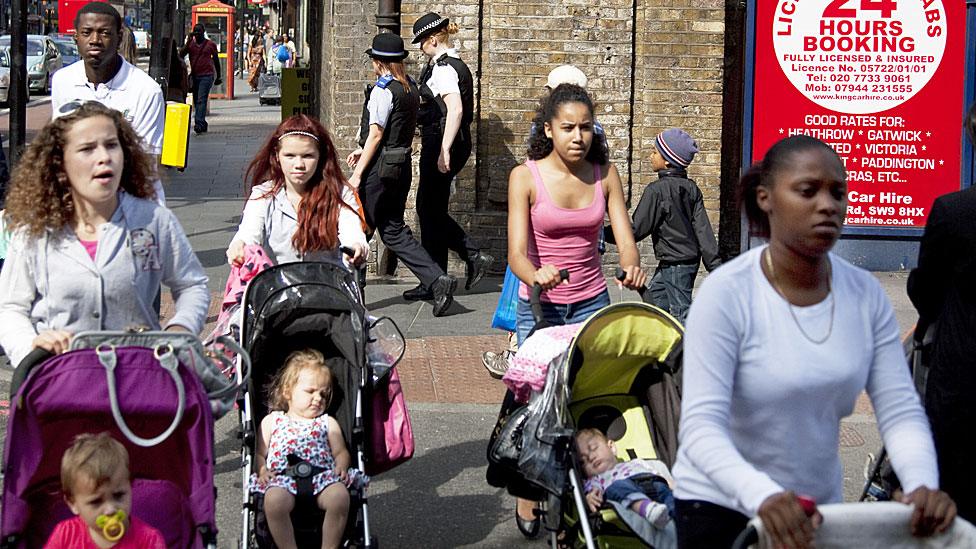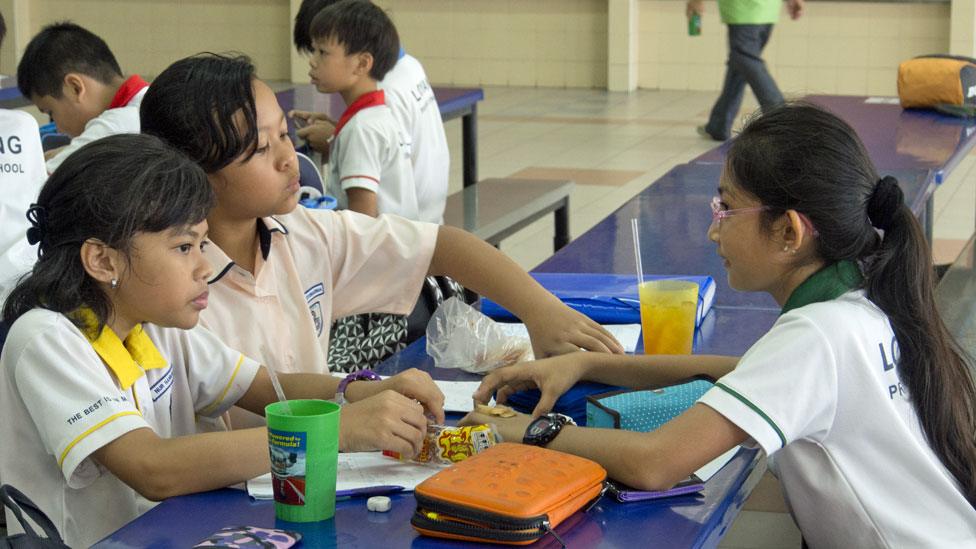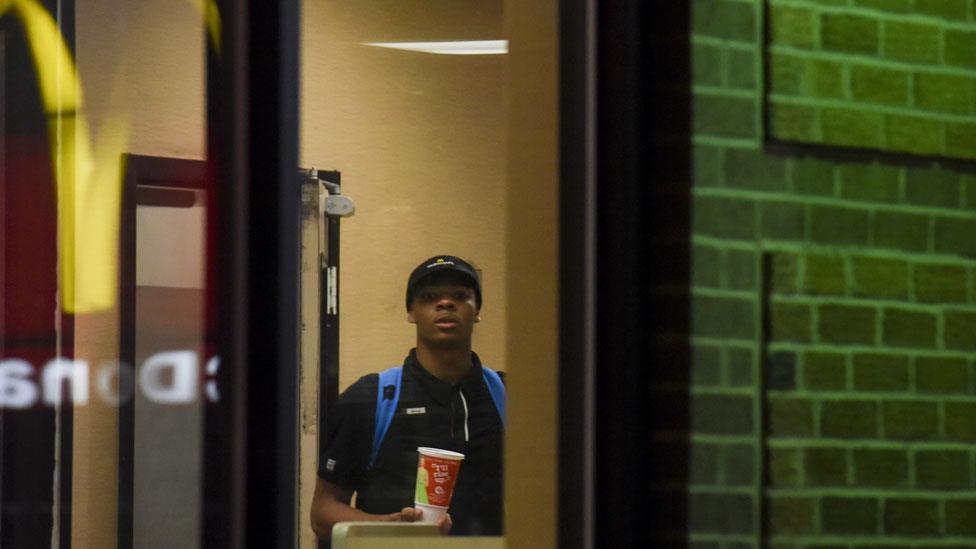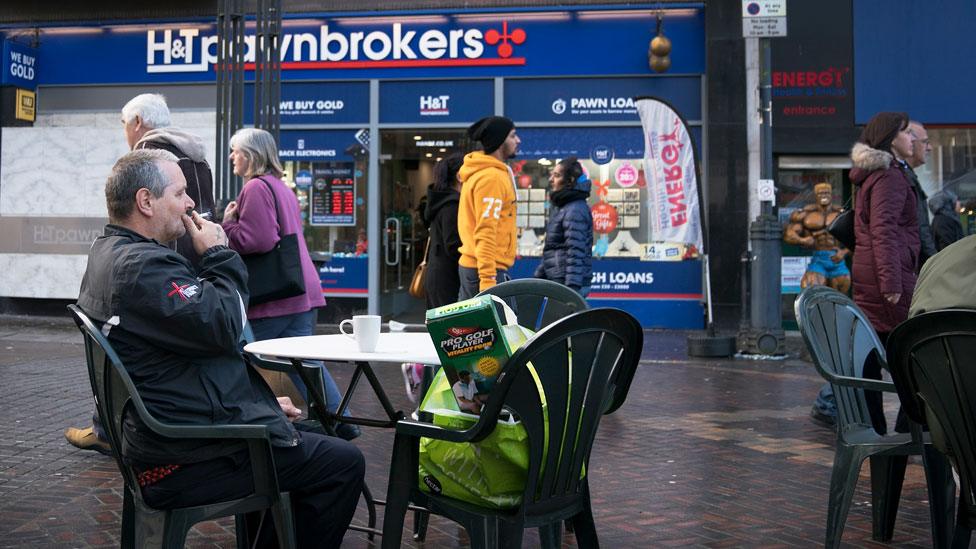Do schools help or hinder social mobility?
- Published
- comments

In the US, social mobility is proving elusive for younger generations
Do schools help social mobility and fairness? Or do they give even more advantages to the better-off?
Even if they can't make up for all inequalities, at least we might expect them to make the playing field more level.
But a major international study on social mobility from the OECD economics think tank shows a more sobering picture.
Each year that a child spends in education, the gap between rich and poor grows wider.
On average, across more than 60 countries, that difference between the richest and poorest is the equivalent to three years of schooling by the age of 15.
Only about one in 10 children from poor backgrounds will achieve the same results at those from wealthy backgrounds.
Gap getting wider
The study tracked test results taken by 10-year-olds in 1995, 15-year-olds in 2000 and then a decade later for young adults in their mid-20s.
At each point the social divide, with few exceptions, tended to widen.

Social mobility has slowed so much it would take five generations for the poor to get to average incomes
It's not that difficult to see how this happens.
The children of more prosperous families are travelling in an educational fast lane, with more support from home, a higher chance of getting into a good school and university, and benefiting from the interventions of better-educated parents.
The accumulation of advantages will amplify differences.
According to the study, on average by the age of 15 about 13% of the variation in students' performance will be determined by their social background.
This varies between countries. In the UK, it's below average at 11%, with Norway and Estonia lower at 8%. In France it's 20% and in Germany and Switzerland it's 16%.
Defying the odds
But it's not all pessimism. The OECD's head of education Andreas Schleicher, argues there is also plenty of evidence to say that "poverty need not be destiny".
There are school systems where many more disadvantaged children do well.

In Singapore, even the poorest pupils do well by international standards
In countries such as Singapore, Japan and Finland, the test results of the poorest 20% are higher than the richest 20% in the Slovak Republic, Uruguay, Brazil and Bulgaria.
The UK does quite well on this measure, with the median point for UK students being above the wealthiest 20% in Italy and not far behind those similarly advantaged students in Spain.
"It shows that students from very similar backgrounds can have very different outcomes," says Mr Schleicher.
He says it's a cause for optimism that some countries have made sure that "excellent teaching" is available for rich and poor pupils.
The study also found other factors associated with disadvantaged pupils defying the odds, including in Vietnam and China.
One pattern that emerged strongly was the importance of the social profile of the school they attended.
In many countries, disadvantaged students tend to be clustered together in schools with other similarly disadvantaged students.
If this can be prevented, the study shows that disadvantaged students taught in schools with a wealthier intake tend to have much higher results.
More places, fewer choices
But the research also shows how easily inequality can be absorbed into education systems.
"A rising tide doesn't automatically lift all boats," says Mr Schleicher.
Numbers going into university have increased - but that doesn't necessarily make it a fairer system.

The gap in skills and opportunities gets even wider in the years after school
In Singapore, many going to university will be the first in their families to get a degree. It's an example of social mobility and widening doors.
But in Italy, wealthier families have been much more likely to benefit from extra university places, widening the education gap.
In terms of "equity", Italy has been going backwards, says Mr Schleicher.
There are also generational divides.
In the US, looking at people between 26 and 65, the older age groups are much more likely than the younger ones to have advanced further in education than their parents.
You can see educational mobility withering through the more recent decades.
Social division
The big picture is the struggle to kick-start social mobility in Western democracies.
A report earlier this year from the OECD showed that in the UK, social mobility was so frozen that it would take five generations for poorer families to reach the average income.

There are warnings that income inequality and educational disadvantage are widening social divisions
"Meritocracy is the big promise of our democracies, and social mobility is the truth test for meritocracy," says Mr Schleicher.
"So, yes, I think we need to worry if social mobility is limited or slowing down."
He says the slowdown is not simply a case of there being many more people with higher qualifications competing with each other, because the demand for graduates and skilled workers has increased at least as rapidly.
Instead he warns of a system in which social division becomes embedded.
"Lower social mobility and higher income inequality tend to go together," he says.
As the wealthiest families accelerate even further ahead, it's likely to even further narrow the chances for "talented yet underprivileged individuals" who are being left behind.
"It's a worry, because it shows our education systems have not been able to moderate social inequality. Instead social inequality has grown," says Mr Schleicher.

More from Global education
The editor of Global education is sean.coughlan@bbc.co.uk